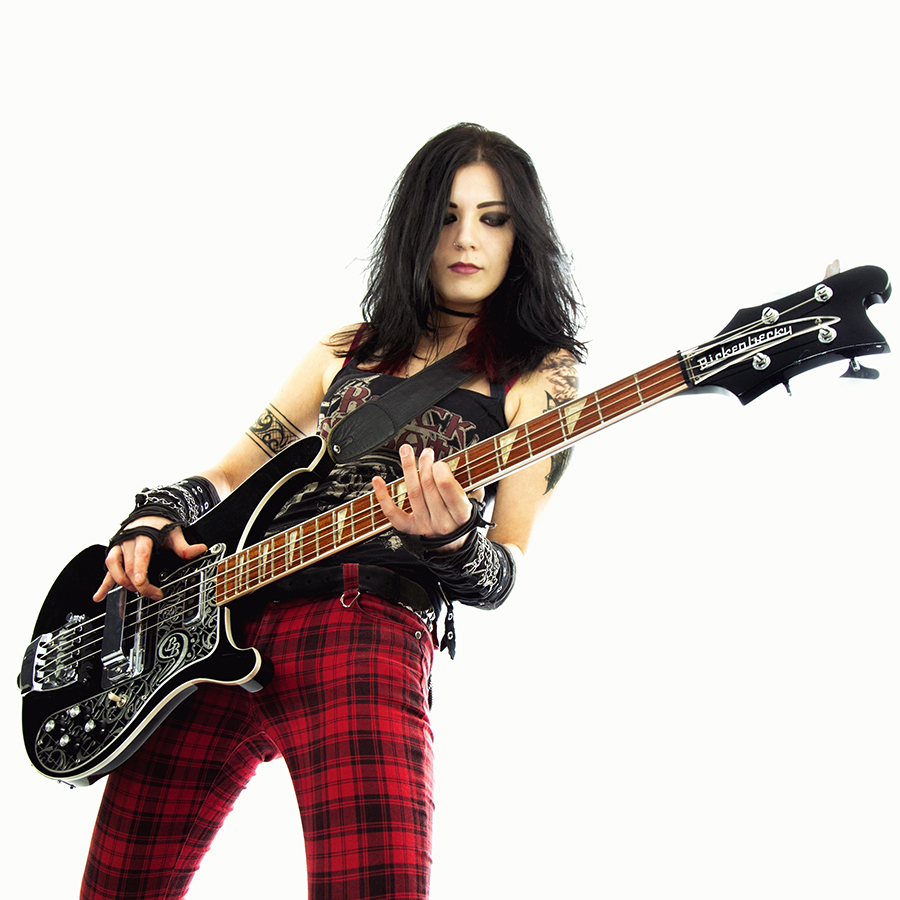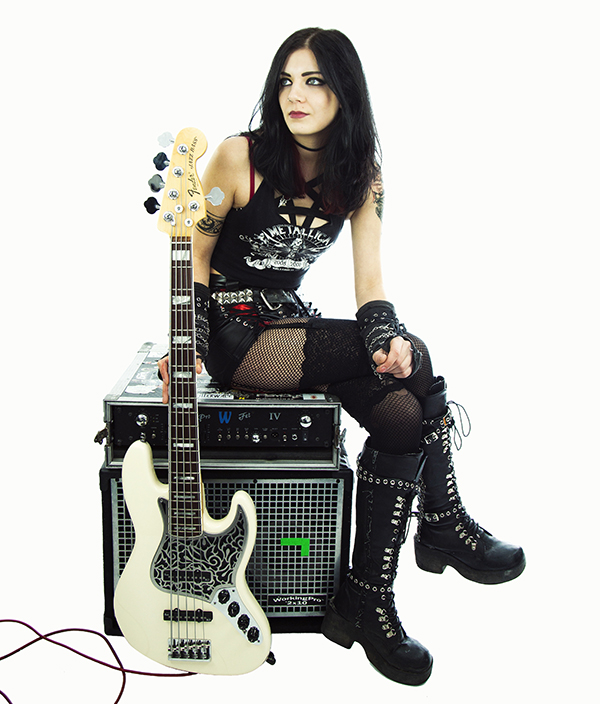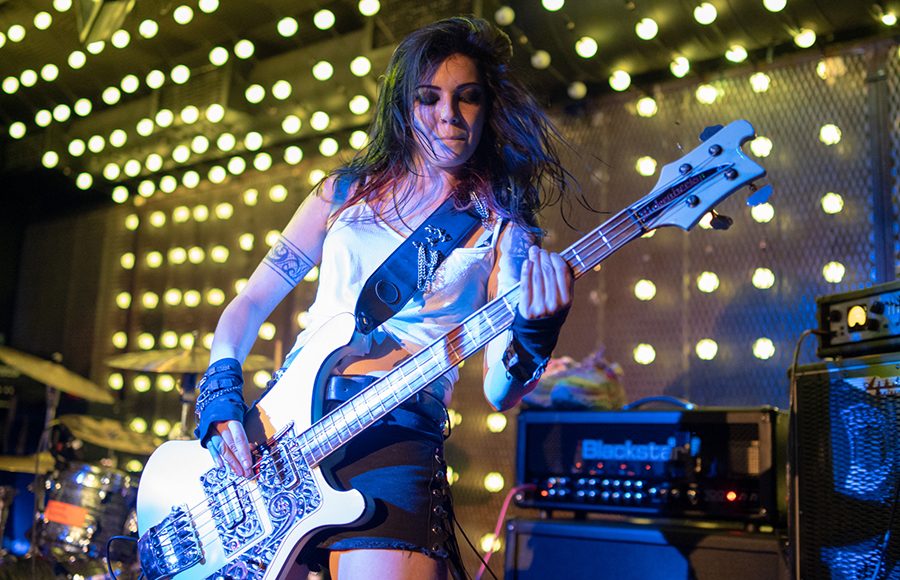Becky Baldwin is a dynamic live performer, as her shows with prominent UK metal band Fury will be showcasing on their current UK tour. Bass Guitar Review’s Andy Hughes chatted with Becky at her home in Birmingham about fingerstyle versus pick playing, being an educator, and waiting for that call to play a gig with Metallica.
Why did you start playing bass, Becky?
I grew up listening to music, and a lot of my friends were getting into bands and playing guitars, and my sister played guitar. I just wanted to play something different, not to copy everyone else, but still get to play along. When I tried bass and I found I liked it, I realised that quite often that the bass player in the band is the cool one. It’s not the instant impact when a band start to play, but if you check out the bass player, they are usually being cool in an understated way.
You play a Rickenbacker bass, is it heavy to move around with it on stage?
It’s not actually as heavy as my Fender Jazz, but yes, it is a solid instrument. It takes a bit of getting used to if you usually play a bass with a thinner neck, but I found that once I got used to the different feel of a Rickenbacker, I really liked it, and I am really pleased I made the effort to get used to it.
Is the Rickenbacker your first choice for gigs?
It is my ‘go to’ bass yes, but sometimes I need a five-string and then I bring my Fender out. I would like a five-string Rickenbacker, but I like the older models and they are quite hard to find and they are really expensive. But I do keep my eyes open, and hopefully one day I will get one. I went to Los Angles just before the Covid restrictions hit, and I visited the Rickenbacker factory. I tried one of the new five string models, and I did like it, but to be honest, I do prefer the look of the older models, so that’s what I am holding out for. You have to love the look of your instrument, or you are not going to want to play it every day.

When you play, you look a lot like Robert Trujillo, you have that same attacking style, and you really dig into your strings. Was that something you decided to learn, or has it always been your natural technique?
I have always played that way because I first played bass at school. There was always guitars and drums to compete with, and the school amplifiers were really underpowered, so everyone played as loud as they could to be heard, and that went for me as well. I found that hitting the strings as hard as I could meant I could get some sound through. It did sometimes mean blowing the school amps and having to apologise to the music teacher!
A lot of bassists who prefer finger-style playing to using a pick say that they feel more ‘in touch’ with their instrument. Would you agree?
Definitely. I feel that I can find notes far more easily and instinctively if I am using my fingers rather than a pick. I like to perform a lot on stage, I move around quite a bit and if I didn’t have a proper grip on my bass, it could swing out as I move and make me miss a note. Having both hands free to control the bass is far more comfortable. Playing with a pick does sound cool, but it’s about finding a style that is comfortable for the individual player, and I never managed to get along with picks. I sometimes have a few notched into my pedal board and throw them out into the crowd afterwards because fans love to get them as souvenirs.
You play mostly in hard rock and metal bands, do you have other styles?
I do, I used to play in function bands for parties and weddings, so I can play a pop style if needed. I do like funk as well, I think a lot of bass players do, whatever style they may play with their own bands. I never got into really poppy or jazz styles like slap bass, but I do love some of the fast complex stuff that people like Bootsy Collins or Larry Graham can do.
As well as being a professional musician, you are also an educator, how did that come about?
It started because when I graduated from BIMM in Bristol. I needed some work because gigging wasn’t enough to make a living, so I started a teaching company with some other graduates, and we eventually got our own premises. I also re-connected with the people who taught me at BIMM, and at the ACM in Birmingham, and did some work there. It works out really well because I am able to teach in the week and then gig at weekends, so it’s a nice mix.
Is it hard to fit in teaching and working with live bands, touring and so on?
It can be done, because a lot of universities and institutions that teach music want to employ working musicians to teach their students. It’s far more exciting for students to be taught by someone who can explain what touring and recording are like, so the people in charge are willing to fit around the schedules of their teachers to enable them to work as gigging musicians as well.
Do you like to extend your technique when you write new material?
I do, but I am always mindful of reproducing what I write when I play on stage. If you are like The Beatles, and end up working only in the studio, you can work out what you like. But if you are gong to have to play a line live, you may need to work out a simpler and more practical version for the song that will work in a live environment. It’s one thing to play a complex line in the studio, but it’s something else when I am running around the stage and flinging my hair about, and still playing! That’s when a practical solution comes in, something a little less complex that still fills the slot in the song.

Who were your heroes and influences when you first started playing bass?
I have always loved Geezer Butler and Cliff Burton. I think Geezer has always been really underrated as a bassist, and as a musician. He always played these wonderful bluesy lines, and he never played the same thing twice; he was always looking for new ways to express himself on bass. He has always been a real inspiration to me as a bass player.
Do you think having long fingers assists you as a bassist?
It does, but that’s not to say you can’t be a good bassist if you have shorter fingers or small hands. It helps your fretting hand in reaching some notes, but there are exercises to help you to stretch those tendons and reach the notes you need. I always start my new students off with stretching exercises. When they say they can’t reach this note or that note, I say that they will when they gave got their technique right and have done the stretching. Elton John can’t span an octave on the piano, his hands are not big enough, but it certainly hasn’t held him back. There are always technical fixes you can use to get around any issues like that.
One of the lessons you offer to your students is to teach them their favourite song. Have you ever come up against anything you couldn’t play, or couldn’t teach?
I have come up against a few songs that I don’t know, and had to work something out on the spot. I haven’t come across anything I can’t play, but teaching it can be another matter. It depends on the complexity of the bass part for the song and the ability of the student I am teaching it to. Sometimes a song can be so complex that I have to tell the student that I can teach it to them, but it’s going to take years before they can play it properly at full speed. A lot of students want to learn Anaesthesia by Metallica, and the first part is OK, but then it goes off into something really complex, because Cliff Burton was an amazing bassist. I tell anyone who wants to learn that, you’re not going to get there overnight!
Do you find much sexism in music today?
Sometimes, enough to remind me that it is still out there. It was worse when I started out because I was at a lower level then, and a lot of people just didn’t expect a female musician to be any good. I’d get sound engineers asking my guitarist to sort out my EQ, things like that. Also, I do the bookings for Fury, and some people are surprised to have to discuss the business of the band with a woman. I think people assume a female musician doesn’t know what she’s doing, so we have to work much harder to reach the levels of respect that men get automatically, But then again, I am an example to any other women out there that it can be done. I am the bassist in my band, and I make my living playing gigs with them, and if I can do it, so can they.
Who would be your dream band to sit in with for one show?
That would have to be Metallica! I remember the Download show when Lars was ill, and other drummers came and played the set with the band. If I’m there and Robert fancies sitting it out for a show, I will be ready to step in. We’d have to play just the songs I know, but that’s a good hour-and-a-half of material, so I am ready if the call comes!
https://beckybaldwinbass.bigcartel.com






